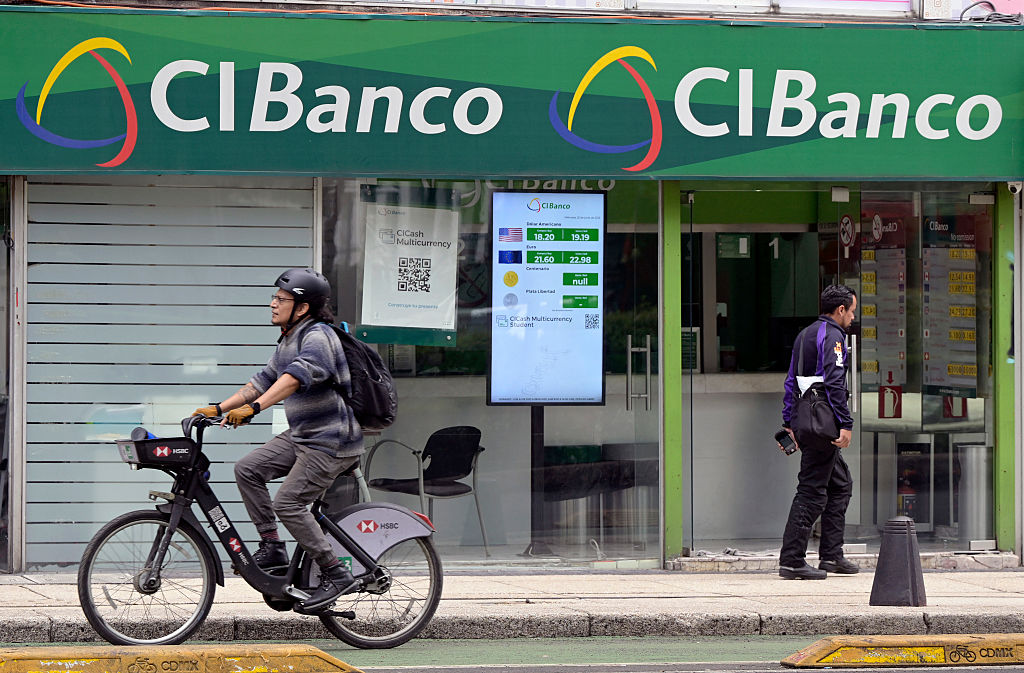
This article has been updated.
Since Day 1 of the second Trump presidency, the administration has had a laser focus on Mexico and cartel activity. Up until now, the Trump administration’s campaign against the drug trade and cartel activity has been largely limited to legal actions against fly-by-night bulk cash smugglers, kingpins, and cartel members themselves.
However, recent enforcement measures targeting Mexican firms stand to have profound implications for companies doing business in Mexico. The U.S. Department of Treasury’s (Treasury) Financial Crimes Enforcement Network (FinCEN) issued sanctions against three Mexican financial institutions on June 25, prohibiting U.S. financial institutions from transmitting any funds to and from these entities.
Treasury described the orders as “historic” and FinCEN called them “unprecedented.” The sanctions represent the first use of a powerful new legal authority: the Fentanyl Eradication and Narcotics Deterrence (FEND) Off Fentanyl Act. Adopted in 2024, the legislation gives Treasury the power to impose special measures against financial institutions, transactions, or accounts of primary money laundering concern in connection with criminal and terrorist organizations trafficking fentanyl and other narcotics.
What makes this development especially striking is not the use of a new law, but instead that the U.S. government has now gone after well-known and legitimate firms in the Mexican economy for alleged cartel-related activity. It is now clear that any company involved in U.S.-Mexico cross-border business could fall under the microscope.
President Claudia Sheinbaum referred to the sanctions during a June 26 press conference, stating that Treasury had not provided any evidence of the alleged money laundering. She added that “Mexico must be respected,” and that “We are no one’s piñata.”
A new enforcement focus
In one of President Trump’s first executive orders, he instructed the U.S. Department of State to designate certain cartels as Foreign Terrorist Organizations (FTOs) and Specially Designated Global Terrorists (SDGTs), and many of the entities ultimately designated are active in Mexico. The U.S. Department of Justice’s (DOJ) Attorney General, Deputy Attorney General, and Head of the Criminal Division have each issued memos and guidance since then directing DOJ prosecutors to prioritize investigation of drug trade, human smuggling, and violent crime by transnational criminal organizations guided by the “total elimination of cartels” directive.
The DOJ and Treasury have quickly followed suit. In March 2025, Treasury’s Office of Foreign Assets Control (OFAC) designated six individuals and seven entities said to be involved in large scale “bulk cash” money laundering for the Cártel de Sinaloa. In May 2025, OFAC and FinCEN targeted members and entities associated with the Cártel de Jalisco Nueva Generación (CJNG) and involved in huachicol crude oil smuggling schemes, described as a “cash cow” of the cartel. Also in May 2025, the DOJ indicted a Mexican national and alleged human smuggler in the first CJNG material support of terrorism charges.
The June 25 FinCEN orders, in contrast, apply to three important and reputable players in the Mexican financial services sector: CIBanco S.A., Intercam Banco S.A. and Vector Casa de Bolsa, S.A. de C.V. CIBanco responded to the FinCEN orders the same day, stating that the firm “does not maintain illegal business relationships and reiterates its compliance with all guidelines established by enforcement authorities.” Intercam stated publicly “Our goal is to collaborate constructively with the authorities, protect the interests of our clients, and continue promoting transparency and confidence in the Mexican financial system.” Vector also issued a press release stating that it “categorically rejects any accusation that compromises its institutional integrity.”
These are firms that serve as reliable trustees for major projects, have respected high-profile lawyers and businesspeople sitting on their boards, and enjoy long-standing relationships with major multinational companies. They are far from the types of organizations that serve merely as fronts for organized crime or operate in the cross-border shadows. As such, the announcement has sent a shock through the Mexican economy.
Potential outsized effects
Few specifics are known about the type of alleged conduct at the basis of the FinCEN orders. FinCEN states that each institution is of “primary money laundering concern in connection with illicit opioid trafficking.” It found “reasonable grounds” to conclude that the organizations facilitated opioid trafficking, including by facilitating transactions that financed the importation of precursor chemicals. Of note, the same day, the Mexican Ministry of Finance issued a statement reporting that it had not received any probative evidence linking the organizations to illicit activity.
In a way, the FinCEN sanctions are targeted. The restrictions apply only to certain U.S. financial institutions, including banks, broker-dealers, futures commission merchants, brokers in commodities, mutual funds, and money services businesses. These institutions are only prohibited from “engaging in any transmittal of funds” to or from the three Mexican entities. Companies can otherwise still do business with them, open accounts, or use them for services like trading or as trustees.
But in practice, the orders can potentially have an outsized and crippling effect. Companies using accounts of the designated entities that wish to make transfers to and from the United States will need to open new accounts at new banks. Firms providing services to the banks might find it difficult to get paid, depending on how payment receivables are structured.
Other banks might slow down or even reject an otherwise lawful transaction involving one of these organizations if the banks need time to perform thorough due diligence or perceive risks as simply too high. Visa already took the unilateral step of shutting down its platform for all international transactions connected to credit cards issued by CIBanco. Fitch downgraded the three financial institutions two days after sanctions were announced.
As a result of the orders, Mexico’s National Banking and Securities Commission has also intervened and is now supervising the three entities, which could help stabilize them, but could also result in additional bureaucratic obstacles when dealing with them.
It also appears that there is continued back-and-forth between the U.S. and Mexican governments on this issue. Just today, FinCEN announced that it was granting an extension of an additional 45 days for the orders to take effect. It stated that the temporary reprieve was due to the fact that “the Government of Mexico has taken further steps to address the concerns raised in FinCEN’s orders, including by assuming temporary management of the affected institutions to promote regulatory compliance and the prevention of illicit finance.” Nonetheless, some would say that the damage to these three institutions has already been done.
Looking ahead
What is the takeaway for companies involved in Mexican business? The U.S. government is now ready to proceed against any actor connected to cartel activity, not just the cartels themselves or their close allies. Enforcement can target the financial institutions helping launder money, the companies providing material support to designated criminal enterprises, and the businesses that pay bribes in connection with cartel activity.
Traditional corporate controls designed to prevent illicit payments and dealings with sanctioned entities, while playing an important role in managing these new risks, might not be sufficient. Companies doing business in Mexico should actively assess their current controls against new risks to ensure compliance programs are effectively calibrated. Above all, firms should assume this is just the beginning of a new and aggressive U.S. enforcement landscape.
(This article was updated on July 9 to include the FinCEN decision extending the Treasury Department’s ban on certain fund transfers to the three designated firms until September 4.)











